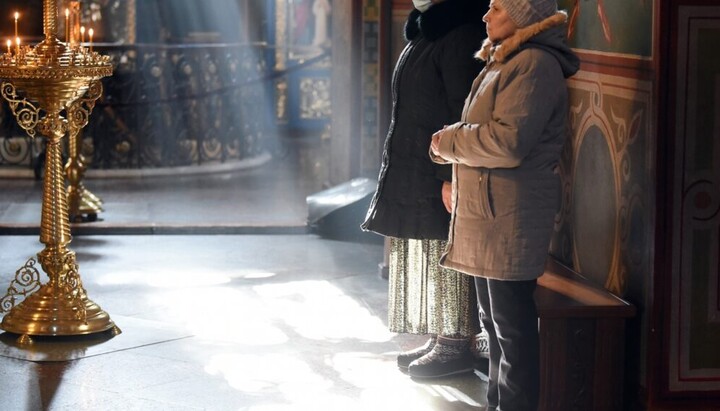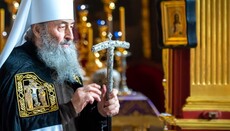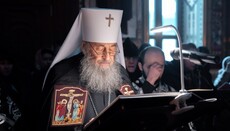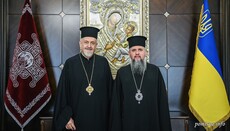Phanar-affiliated media outlet suggests creating an Exarchate in Ukraine

A Constantinople-affiliated publication has proposed establishing a temporary Exarchate as a “transitional space” for those unwilling to join the OCU.
The Phanar-aligned outlet Orthodox Times published an extensive article by theologian Pavlos Liberman proposing the creation of a temporary Exarchate of the Ecumenical Patriarchate in Ukraine as a way to resolve the ongoing church crisis.
According to the author, such an exarchate would "house" the UOC, which “for objective reasons cannot yet join the Orthodox Church of Ukraine.”
Risk of political intervention into the church issue
Liberman argues that “if the Ecumenical Patriarchate does not intervene promptly, the situation in Ukraine risks becoming a pawn in political games.” He notes that the Ukrainian government, through Law No. 3894, “is pressuring the Ukrainian Orthodox Church (under Metropolitan Onuphry) to sever ties with the Moscow Patriarchate – effectively trying to resolve a church issue by political means.”
The author warns that in future peace negotiations with Russia, there are attempts to secure a “special status” for structures under the Moscow Patriarchate, which could be embedded in any final agreements. However, “these political formulas do not resolve the ecclesiastical problem; rather, they preserve parallel church structures indefinitely,” Liberman writes.
“If the Ecumenical Patriarchate does not propose its own canonically grounded solution, there will arise a temptation to replace ecclesiastical healing with political arrangements. This is precisely what must be avoided and it is not only the right, but also the pastoral duty, of the Ecumenical Patriarchate to ensure it,” he insists.
Criticism of the OCU’s approach
Liberman criticizes the methods by which the OCU sought to achieve unity after receiving the Tomos: “Those who received the Tomos were entrusted with the mission of uniting Ukrainian Orthodoxy, yet the methods chosen often contradicted the spirit of Christian ethics and Orthodox ecclesiology. Autocephaly has been achieved and is irreversible but unity has not yet been realized.”
He points out that internal tensions within Ukrainian Orthodoxy are fueled by mutual distrust, while local conflicts over churches and parishes multiply faster than instances of genuine reconciliation.
The article highlights the principle of voluntariness: “In 2018, particularly in the communiqué of the Holy Synod dated October 11, the inadmissibility of violence and coercion in regulating church life in Ukraine was clearly emphasized. Wherever administrative pressure replaces pastoral guidance, the result is formal 'transfers' that divide communities, parts of which continue to exist separately and turn into irreconcilable opponents.”
How the proposed exarchate would function
According to Liberman, the temporary exarchate should operate on principles of voluntary participation and gradually promote integration into the OCU.
“The essence of the proposed solution to the problem is simple: the Exarchate would serve as a transitional space for those willing to voluntarily withdraw from the Moscow Patriarchate, those ready to definitively sever ties with Moscow but who, for objective, personal, or historical reasons, cannot recognize the authority of Metropolitan Epifaniy,” he explains.
The goal of the exarchate, he continues, would be “first, to achieve theoretical unity (mutual recognition and reconciliation) and practical unity (Eucharistic communion), and subsequently to establish institutional unity within Ukrainian Orthodoxy.”
Liberman stresses that the exarchate should be temporary: “The proposed Exarchate is not intended as a permanent structure but as a temporary one, a framework that will cease to exist once it has fulfilled its mission.”
He argues that such a step “would not violate the Tomos of autocephaly” and would be consistent with the prerogatives of the Ecumenical Patriarchate, which retains the right of appeal and the authority to create stavropegial institutions and exarchates.
“Therefore, even formally, the establishment of a temporary exarchate does not undermine the act of autocephaly – it rather facilitates its full realization under difficult circumstances,” he writes.
The proposal envisions starting with “pilot structures under direct supervision, with the status of temporary stavropegial institutions,” to be expanded later.
International criticism of Ukraine’s religious policy
Liberman cites criticism from international organizations regarding Ukraine’s religious policy. He notes that the 2024 reports of the U.S. Commission on International Religious Freedom (USCIRF) “highlighted the risks of disproportionate application of the law in the field of religious freedom.”
Moreover, “the Office of the United Nations High Commissioner for Human Rights, in December 2024, criticized certain legislative changes as potentially imposing excessive restrictions, urging Ukraine to align its legal practices with international standards,” the article says.
The author argues that creating such an exarchate would improve “Ukraine’s image before international observers monitoring religious freedom worldwide.”
Consequences for the Orthodox world
Liberman warns that delaying a resolution to the Ukrainian church issue “creates risks that will later be far more difficult, or even impossible, to resolve.” The politicization of the matter, he says, would harm the entirety of global Orthodoxy: “It would weaken mutual trust among the Churches, cause internal divisions within the Ancient Patriarchates and Autocephalous Churches, undermine the prerogatives and authority of the Ecumenical Patriarchate, and restrict the possibility of convening Pan-Orthodox gatherings.”
“Most importantly, it would abandon thousands of faithful who are ready to step out from Moscow’s influence but fear losing their ecclesiastical legitimacy,” he concludes.
Liberman calls on the Ecumenical Patriarchate to act “not as a party to the conflict, but as the guardian of unity and order in the service of peace.”
Earlier, the UOJ reported that a Phanar-linked media outlet had written about Patriarch Bartholomew’s growing disappointment with the OCU.












